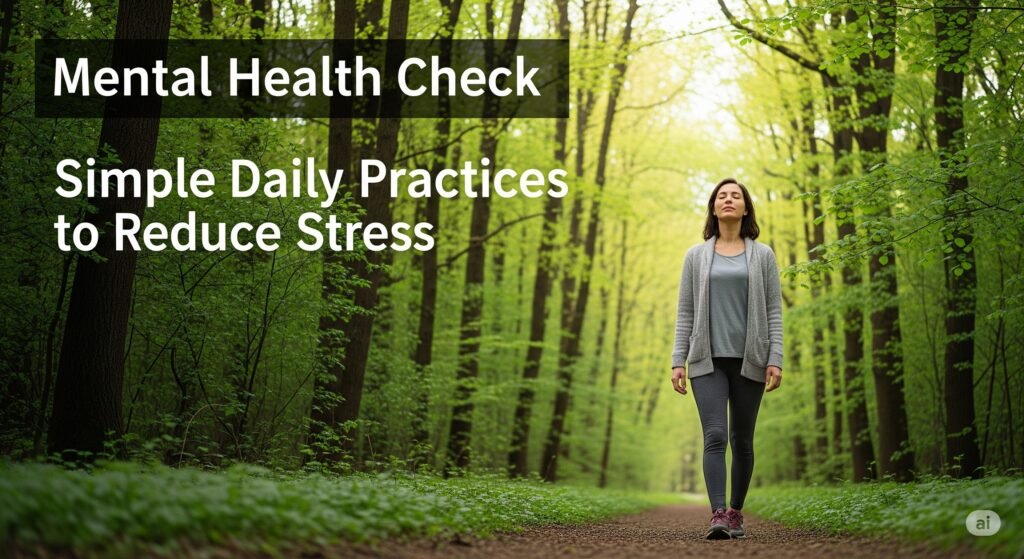Discover simple daily practices to reduce stress and improve your mental health. Learn effective techniques for a calmer, more balanced life.
In today’s fast-paced world, stress has become an all-too-common experience. It’s crucial to take a step back and prioritize our mental well-being. This blog post explores simple yet effective daily practices you can incorporate into your routine to reduce stress and foster a healthier, more balanced life. These techniques are designed to be accessible and easily integrated into your day, helping you to manage stress and improve your overall mental health.
1. Start with Mindfulness
Mindfulness involves focusing on the present moment, acknowledging your thoughts and feelings without judgment.
- Meditation: Even five minutes of daily meditation can significantly reduce stress and anxiety. Find a quiet spot, focus on your breath, and let your thoughts pass without engaging with them.
- Deep Breathing: Practicing deep, slow breaths can calm your nervous system. Try inhaling deeply through your nose, holding for a few seconds, and exhaling slowly through your mouth.
- Body Scan: Focus your attention on different parts of your body, noticing any sensations without trying to change them. This can help you become more aware of physical tension and release it.
2. Incorporate Physical Activity
Exercise is a powerful stress reliever. It releases endorphins, which have mood-boosting effects.
- Regular Exercise: Aim for at least 30 minutes of moderate exercise most days of the week. This could be walking, jogging, swimming, or cycling.
- Yoga: Combines physical postures, breathing techniques, and meditation to promote relaxation and reduce stress.
- Quick Walks: Even short walks during your workday can help clear your head and reduce feelings of overwhelm.
3. Prioritize Sleep
Adequate sleep is essential for mental and physical health. Lack of sleep can exacerbate stress and anxiety.
- Consistent Sleep Schedule: Try to go to bed and wake up at the same time each day, even on weekends.
- Relaxing Bedtime Routine: Create a calming routine before bed, such as reading, taking a warm bath, or listening to soothing music.
- Limit Screen Time: Avoid using electronic devices at least an hour before bed, as the blue light can interfere with sleep.
4. Nurture Social Connections
Connecting with others can provide emotional support and help you feel less alone.
- Spend Time with Loved Ones: Make time for friends and family. Share your feelings and listen to theirs.
- Join a Group or Club: Engaging in activities with others who share your interests can create a sense of belonging and support.
- Communicate Openly: Express your feelings and needs to those around you.
5. Practice Self-Care
Self-care involves taking deliberate actions to look after your mental, emotional, and physical health.
- Engage in Hobbies: Make time for activities you enjoy, whether it’s reading, gardening, painting, or listening to music.
- Set Boundaries: Learn to say “no” to commitments that add unnecessary stress to your life.
- Practice Gratitude: Take a few minutes each day to reflect on the things you’re grateful for. This can shift your focus from negative to positive.
6. Maintain a Healthy Diet
What you eat can impact your mood and stress levels.
- Balanced Meals: Eat a diet rich in fruits, vegetables, whole grains, and lean protein.
- Limit Caffeine and Alcohol: These substances can worsen anxiety and disrupt sleep.
- Stay Hydrated: Drink plenty of water throughout the day.
7. Journaling
Writing down your thoughts and feelings can help you process emotions and reduce stress.
- Daily Journaling: Set aside time each day to write about your experiences, feelings, and thoughts.
- Gratitude Journal: Focus specifically on writing down things you are grateful for.
- Guided Journals: Use prompts to help you explore your emotions and experiences in a structured way.
8. Time Management
Effective time management can reduce feelings of being overwhelmed.
- Prioritize Tasks: Make a list of what needs to be done and focus on the most important items first.
- Break Down Large Tasks: Divide large projects into smaller, more manageable steps.
- Take Breaks: Regular breaks can help you stay focused and prevent burnout.
9. Seek Professional Help
If stress feels overwhelming and unmanageable, don’t hesitate to seek professional help.
- Therapists and Counselors: Can provide support and teach coping strategies.
- Support Groups: Connecting with others who are experiencing similar challenges can be beneficial.
Conclusion
Incorporating these simple daily practices into your routine can significantly reduce stress and improve your mental health. Remember, it’s about making small, consistent changes that add up over time. Take care of yourself, and prioritize your well-being.










